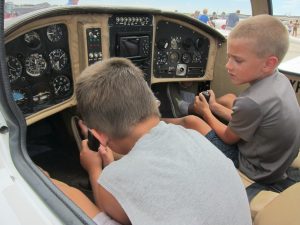
Building confidence as a student pilot is a crucial part of your flight training journey. The path to becoming a skilled and independent pilot can be filled with moments of self-doubt, especially when facing new challenges or mastering complex skills. However, with the right strategies and mindset, you can overcome these doubts and build the confidence needed to succeed in your training and eventually take to the skies solo.
In this guide, we’ll explore effective ways to build confidence as a student pilot, from mastering key flight maneuvers to developing a positive mindset and trusting your training.
Table of Contents
Why Confidence Matters in Flight Training
Confidence is not just about feeling good about yourself; it’s about trusting your skills, staying calm under pressure, and making safe, informed decisions during flight. As a student pilot, building confidence will:
-
Improve your ability to handle new or stressful situations.
-
Enable you to make quick and accurate decisions in the air.
-
Enhance your overall learning process by reducing hesitation.
-
Ensure you’re ready to tackle solo flight when the time comes.
A lack of confidence can lead to unnecessary mistakes, stress, and even hesitation to perform essential maneuvers. So, building that confidence early on will set you up for success throughout your entire flight training journey.
Common Confidence Challenges for Student Pilots
Many student pilots face similar challenges when building their confidence. Here are some of the most common issues:
1. Fear of Making Mistakes
Mistakes are a natural part of the learning process, but they can be hard to accept for student pilots who feel they should be perfect. Fear of making mistakes can paralyze you and hinder your ability to take risks, which is essential for growth as a pilot.
2. Imposter Syndrome
It’s common for student pilots to feel like they don’t belong in the cockpit or aren’t as skilled as their peers. This feeling of being an “imposter” can undermine your confidence, especially if you compare yourself to other pilots who seem more experienced.
3. Difficulty Mastering Complex Skills
Flying an aircraft involves learning many different skills, from controlling the aircraft to communicating with ATC. Some students may feel overwhelmed when trying to master new maneuvers or concepts, which can lead to frustration and reduced confidence.
4. Fear of Solo Flight
The thought of flying solo is a huge milestone, but many students feel nervous or unsure about their readiness for that first solo flight. This fear can stem from the pressure of being responsible for the aircraft and ensuring safety without an instructor by your side.
Strategies to Build Confidence as a Student Pilot
Building confidence doesn’t happen overnight, but with time and effort, you can strengthen your self-assurance in the cockpit. Here are some proven strategies to help you along the way:
1. Master the Basics First
Focus on becoming proficient in the fundamental skills before tackling more advanced maneuvers. Being confident in your takeoffs, landings, and basic flight controls will build a solid foundation and make you feel more in control of the aircraft.
2. Set Small, Achievable Goals
Rather than focusing on the big picture (e.g., flying solo), break your training into smaller, manageable goals. Whether it’s perfecting a specific maneuver or flying a particular type of approach, achieving these smaller goals will give you a sense of accomplishment and help build confidence gradually.
3. Practice, Practice, Practice
Repetition is key to mastering any skill. The more you practice, the more familiar and comfortable you’ll become with the aircraft and various flight situations. This hands-on experience is essential for building confidence.
4. Get Comfortable with Failure
Mistakes will happen, and that’s okay! Don’t let small failures derail your confidence. Learn from them and use them as stepping stones to improve. The more comfortable you become with the idea of making mistakes, the more confident you’ll feel in your ability to handle challenges.
5. Use Visualization Techniques
Visualization is a powerful tool in aviation. Spend time imagining yourself successfully completing maneuvers, executing perfect landings, or handling an emergency scenario with calmness and precision. This mental rehearsal can enhance your confidence and readiness when you’re in the cockpit.
6. Trust Your Instructor
Your instructor has confidence in your abilities, and so should you. They are there to guide you and provide feedback, so don’t be afraid to lean on their experience when you need reassurance. Remember, your instructor will only let you solo once they’re certain you’re ready, which is a huge confidence booster in itself.
7. Take Regular Breaks
Training can be mentally and physically exhausting. Overworking yourself can lead to burnout and decreased confidence. Schedule breaks to rest, reset, and come back to your training with renewed energy and focus.
Overcoming Fear and Self-Doubt
It’s completely normal to feel fear and self-doubt as a student pilot. However, these feelings shouldn’t stop you from progressing. Here’s how to manage them effectively:
-
Acknowledge Your Fears: Recognizing that it’s okay to be afraid helps to demystify your feelings. When you confront your fears, you take away their power over you.
-
Practice Self-Compassion: Be kind to yourself when things don’t go as planned. Remind yourself that you’re learning, and mistakes are part of the process.
-
Talk to Fellow Students or Pilots: Sharing experiences with others who are going through the same challenges can be reassuring. You’ll find that many of your peers feel the same way, which helps normalize the experience.
-
Focus on Positive Outcomes: Remind yourself of your achievements, no matter how small. Building confidence is a cumulative process, and each success adds to your growth as a pilot.
Practical Tips to Stay Confident During Training
-
Prepare Thoroughly for Each Lesson: Review your lesson materials and flight plan before each training session. The more prepared you are, the more confident you’ll feel.
-
Keep a Training Journal: Track your progress, successes, and areas for improvement. Writing down your accomplishments will remind you of how far you’ve come.
-
Celebrate Milestones: Whether it’s your first cross-country flight or completing a difficult maneuver, celebrate your progress. Recognizing these milestones will reinforce your growing confidence.
-
Stay Positive: Adopt a positive mindset and stay optimistic, even when challenges arise. A positive attitude can significantly boost your confidence.
Conclusion
Building confidence as a student pilot is an ongoing process that takes time, practice, and patience. By focusing on mastering the basics, setting small goals, and trusting in your instructor’s guidance, you can overcome self-doubt and develop the skills needed to become a confident pilot. Remember that every flight brings you closer to your goal, and with determination and the right strategies, you’ll be well on your way to achieving solo flight and beyond.
✈️ Ready to boost your confidence? Download our “Confidence Building Checklist for Student Pilots” here to stay on track and stay motivated in your flight training!
